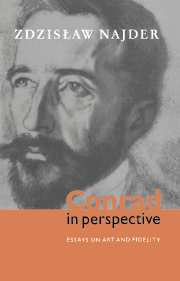Book contents
- Frontmatter
- Contents
- Acknowledgements
- Note on the texts
- List of abbreviations
- 1 Introduction, or confession of a mastodon
- 2 Conrad's Polish background, or from biography to a study of culture
- 3 Joseph Conrad's parents
- 4 Joseph Conrad and Tadeusz Bobrowski
- 5 The Sisters: a grandiose failure
- 6 Lord Jim: a Romantic tragedy of honour
- 7 The Mirror of the Sea
- 8 A Personal Record
- 9 Joseph Conrad's The Secret Agent, or the melodrama of reality
- 10 Conrad, Russia and Dostoevsky
- 11 Conrad and Rousseau: concepts of man and society
- 12 Conrad and the idea of honour
- 13 Joseph Conrad: a European writer
- 14 Joseph Conrad after a century
- 15 Joseph Conrad in his historical perspective
- 16 Fidelity and art: Joseph Conrad's cultural heritage and literary programme
- Notes
- Index
16 - Fidelity and art: Joseph Conrad's cultural heritage and literary programme
Published online by Cambridge University Press: 07 December 2009
- Frontmatter
- Contents
- Acknowledgements
- Note on the texts
- List of abbreviations
- 1 Introduction, or confession of a mastodon
- 2 Conrad's Polish background, or from biography to a study of culture
- 3 Joseph Conrad's parents
- 4 Joseph Conrad and Tadeusz Bobrowski
- 5 The Sisters: a grandiose failure
- 6 Lord Jim: a Romantic tragedy of honour
- 7 The Mirror of the Sea
- 8 A Personal Record
- 9 Joseph Conrad's The Secret Agent, or the melodrama of reality
- 10 Conrad, Russia and Dostoevsky
- 11 Conrad and Rousseau: concepts of man and society
- 12 Conrad and the idea of honour
- 13 Joseph Conrad: a European writer
- 14 Joseph Conrad after a century
- 15 Joseph Conrad in his historical perspective
- 16 Fidelity and art: Joseph Conrad's cultural heritage and literary programme
- Notes
- Index
Summary
I am sure all Conrad readers remember well his words from ‘A Familiar Preface’ to A Personal Record: ‘Those who read me know my conviction that the world, the temporal world, rests on a few very simple ideas; so simple that they must be as old as the hills. It rests notably, among others, on the idea of Fidelity’
That the concept of fidelity occupies a central position within the framework of Conrad's ethical concerns seems quite evident. Ian Watt is, I believe, right in claiming that ‘fidelity is the supreme value in Conrad's ethics’. I propose here to take a closer look at the origins, contents and implications of this concept. I shall also try to demonstrate that there exists a strong conceptual link between Conrad's moral and artistic ideas, and that it is the idea of fidelity which has furnished this link.
The concept of fidelity is, in European tradition, most closely associated with the ethics of medieval chivalry. In fact, it belongs to a tradition which goes back thousands of years. Fidelity to a person, or fidelity to an object or idea, is perhaps the most ancient non-pragmatic rule in human relations. (By non-pragmatic I mean: not following from practical considerations of gain, success, satisfaction of wishes or needs, etc.) Gilgamesh is faithful to Enkindu, Achilles faithful both to the memory of Patroclus and to his obligations to the status of a hero, Hector faithful to his duty in defending Troy, Roland faithful to Charlemagne and to his honour … The line is very long.
- Type
- Chapter
- Information
- Conrad in PerspectiveEssays on Art and Fidelity, pp. 199 - 212Publisher: Cambridge University PressPrint publication year: 1997



